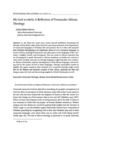| dc.creator | Barron, Joshua Robert | |
| dc.date.accessioned | 2024-01-31T17:03:40Z | |
| dc.date.available | 2024-01-31T17:03:40Z | |
| dc.date.issued | 2021 | |
| dc.identifier.citation | Journal of Language, Culture, and Religion 2, no. 1 (2021): 1-20 | en_US |
| dc.identifier.issn | 2689-8160 | |
| dc.identifier.uri | http://hdl.handle.net/11558/7842 | |
| dc.identifier.uri | https://www.diu.edu/jlcr/volume-2-number-1/ | |
| dc.description.abstract | n the thirty-two years since Lamin Sanneh published Translating the
Message (Orbis Books, 1989), there has been a growing awareness of the importance
of vernacular languages in Christian life and practice. But it is often still assumed
that Christian theologizing is not legitimate unless it is in a European language. In
much of Africa, theological education only takes place in the languages of the colonizers-
English, French, and Portuguese. This can result in African churches that
are ill-equipped to speak relevantly to African situations, as leaders are trained to
read, teach, worship, and pray in a foreign language, neglecting their own. Authentic
African Christianity requires theologizing in local African languages and invoking
God in the names of God in those languages. Though (ironically?) written in
English, this paper examines what elements of a vernacular theology might sound
like for the Maasai and Samburu peoples of East Africa, exploring the Maa and
Sampur names for God and discovering insights for World Christianity as well. | en_US |
| dc.language.iso | en_US | en_US |
| dc.publisher | Journal of Language, Culture, and Religion | en_US |
| dc.subject | Theology, vernacular | en_US |
| dc.subject | Maasai | en_US |
| dc.subject | Hermeneutics, intercultural | en_US |
| dc.title | My God is enkAi: A Reflection of Vernacular African Theology | en_US |
| dc.type | Article | en_US |


